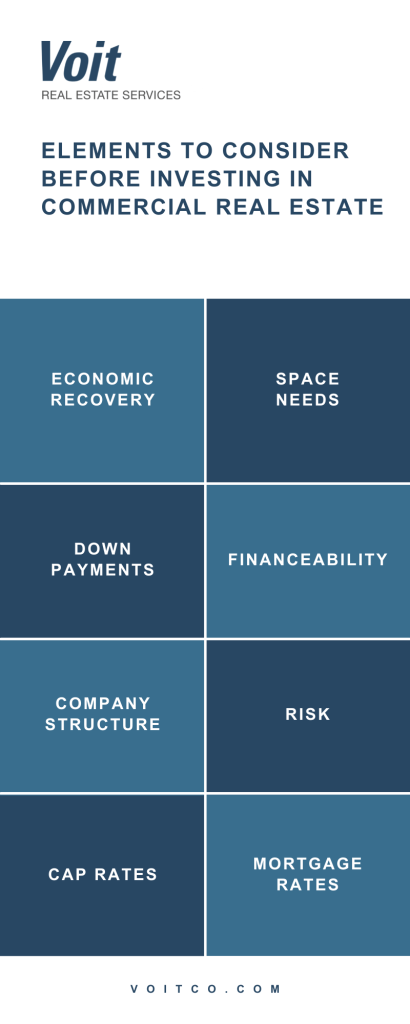
There are, of course, many benefits to investing in commercial real estate. However, after over two years of chaos amid a global pandemic, you might find yourself asking, is it a good time to buy a building?
Let’s discuss the benefits of investing in CRE as well as what elements you should consider before doing so.
The Benefits of Investing in CRE
“The wise young man or wage earner of today invests his money in real estate.” —Andrew Carnegie
There are three main benefits of investing in CRE that we’re going to note—some might refer to it as the CRE trifecta!
Tax Breaks
One huge benefit of investing in commercial real estate is tax breaks. When you own commercial property, you can deduct the following as a tax write-off:
- Mortgage interest
- Depreciation, and
- Operating expenses
For those who are strategic, capital outlays, such as new parking lots or roofs, can be expensed as well.
Appreciation
We know that real estate value increases over time. Given this, another benefit of buying a building is capital appreciation.
Appreciation will vary based on local supply and demand, interest rates, inflation rates, and additional factors.
It’s important, however, to consider the ages of investors. Appreciation can take many years. Older investors might end up passing down a property to heirs who will see the increased value.
Cost Stabilization
Rental rates will increase over time—either by a fixed amount or as a result of changes in the consumer price index (CPI) for those who take on a series of short-term leases (i.e. three to five years).
On the other hand, when you purchase property, you can achieve stable costs by using a fixed-rate debt that can fully amortize over 20 to 30 years.
So, with all of these benefits, why does anyone lease or rent a commercial property? Why not buy? What needs to be considered before investing in commercial real estate?
Let’s dive in.

Elements to Consider Before Investing in Commercial Real Estate
1. Economic Recovery
Although things are not completely back to “normal,” as some might say, over the past year, the Southern California commercial real estate market has begun to gather steam again, as put by CoStar.
Read on for more on commercial real estate sales post-pandemic.
2. Space Needs
Is your company growing rapidly? If so, purchasing property may not be your best bet. By leasing a commercial property instead, you gain the flexibility to accommodate your growing business in the future.
Research shows that if your business plans “to stay in a single location for less than 7 years, then leasing might be a better option.” This research takes into consideration:
- Monthly recurring costs
- Tax savings
- Asset price appreciation
- Increased business equity
- Up-front costs
- Opportunity costs, and
- Money earned in the sale of the property
3. Down Payments
While purchasing property is a great long-term investment, it requires a great upfront cost to do so.
Traditional loans typically require between 10-25% of the commercial property’s total value as a down payment. In some cases, this cost might include not only the down payment but also improvement costs, appraisal fees, loan fees, and more.
4. Financeability
The process of qualifying for necessary loans or financing can be a big hurdle when buying commercial real estate. High interest rates can make leasing a more cost-effective, attractive option, especially if interest rates move upwards of 10%.
But what about those who are waiting for a ‘deal’? To this, Jammie Jelks of Legacy Home Loans says, “the best time to buy a property is when you can afford to. There’s no need to wait for a down market where you try and get a ‘steal.’
“If you can afford to buy, then buy. If you cannot afford to buy, then don’t. A down market for one is not a down market for others.”
5. Company Structure: Publicly Traded?
Generally, publicly traded companies—for example, Apple, Microsoft, JPMorgan Chase, and so on—tend to steer away from building ownership. This way, depreciation won’t impact revenue.
6. Risk
The veracity of any investment can only be determined by comparing it to the alternatives available in the same time frame.
If the yield on a ‘no-risk’ 10-year U.S. treasury bill (T-bill) is 2.8%, as it is today, it makes little sense to invest in real estate that returns just 3% but carries with it considerable risk.
The spread or ‘premium’ over that theoretically riskless asset is what determines the price investors will pay for any particular asset. That premium is subjective and each investor must assess his or her appetite for risk.
Every business owner must develop a unique risk profile that is based on more than the fact that the real estate market happens to be on a roll.
7. Cap Rates
Cap rates are still at historic lows, while the 10-year Treasury yield has more than doubled since last October 2021. That puts pressure on cap rates to rise to maintain a spread that reflects the level of risk of real estate ownership.
An increase in the cap rate causes a corresponding decrease in price. So far, low vacancy in the industrial sector has kept demand from investors strong enough to fend off a rise in cap rates.
However, that could change—especially if the Fed’s response to the spike in inflation slows the economy more than desired.
When it comes to investing in income-producing commercial real estate, you must decide what your risk premium must be before you become a buyer.
8. Mortgage Rates
For the most aggressive owner/user buyers, the risk of a price bubble is offset by historically low mortgage rates.
Fixed-rate mortgages effectively control occupancy costs for up to 25 years, mitigating the risk of a price correction for business owners who believe they can use the same facility for five to 10 years.
That long-term perspective emboldens them to pay a record price for a building that suits their needs. However, the recent spike in mortgage rates from the mid-3% range to the mid-5% range has begun to dampen demand from some owner/user buyers.
Since the rate hikes are recent, it is too early to tell just how much current demand goes away in the coming months.
9. Partnering with a Commercial Real Estate Professional
Given the events that have transpired in two to three years, it is even more important to consider partnering with a CRE professional when it comes to purchasing commercial property.
A top-notch broker has access to timely, accurate market data and is an expert in their local industry. Read on for more information on what a commercial real estate broker does for you.
CRE Properties Thriving Today
The commercial real estate sales landscape, of course, looks different than it did before the COVID-19 pandemic.
Before the pandemic, commercial property performed successfully, including:
- Convention hotels
- Office buildings in downtown spaces
- Mall tenants
These property types, however, did not thrive during 2020 and 2021. According to Real Capital Analytics, stay-at-home orders caused many businesses to close doors and reduce capacity.
On the other hand, there were a handful of commercial properties that not only stayed above water but actually performed well throughout the pandemic. Today, investors are continuing to flock to:
- Warehouses
- Multifamily buildings with desirable amenities (although rent declined at the start of the pandemic, it has been on a solid upward tick ever since, according to CoStar)
- Life sciences
- Hospitality
- Industrial properties
- Storage
The demand for industrial real estate is still running high. In fact, “industrial demand has outperformed as e-commerce and medical device firms expand,” according to CoStar.
A Final Word
At the end of the day, the decision to invest in commercial real estate comes down to your unique business and its needs. It is helpful, however, to look at the current economic environment, trends, and your specific business when making a decision.
Regardless of your choice, you’re not alone in this process. At Voit Real Estate Services, our brokers have the experience to negotiate the best deals with your best interest at the core of everything we do.
Ready to make the big move? Read our blog for tips on how to secure quality commercial office space.
Or, for those who are interested in learning more about our team of client advisors, read on in our article “What’s the Difference Between a Broker and a Client Advisor?”